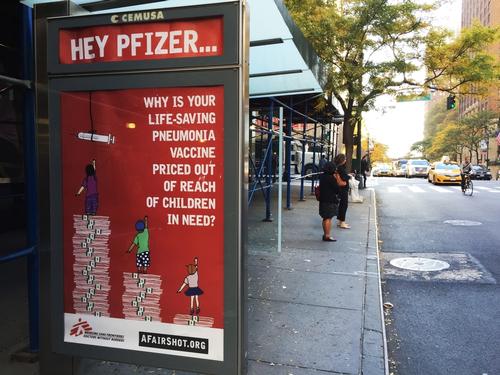New York – Médecins Sans Frontières (MSF) launched a global petition today, World Pneumonia Day, calling on pharmaceutical companies Pfizer and GlaxoSmithKline (GSK) to reduce the price of the pneumonia vaccine to US$5 per child (for all three doses) in all developing countries and for humanitarian organisations.
After years of fruitless negotiations with both companies to lower the vaccine’s price for use in its projects in developing countries and in humanitarian crises, MSF called on the public to help put pressure on the companies. Pneumonia is the leading global cause of childhood death and kills nearly one million children each year.
"The pneumonia vaccine is the world’s best-selling vaccine, and last year, Pfizer brought in more than US$4.4 billion in sales just from this product,” said Dr Manica Balasegaram, Executive Director of MSF’s Access Campaign. “Pfizer and GSK charge such high prices for the pneumonia vaccine that many governments and humanitarian organisations aren’t able to vaccinate children. After combined sales to date of more than US$28 billion for the pneumonia vaccine alone, we think it’s pretty safe to say that Pfizer and GSK can afford to lower the price so all developing countries can protect their children from this childhood killer."
With Pfizer earning more than US$17 million in sales per day from the pneumonia vaccine alone, MSF kicked off the petition campaign on World Pneumonia Day with a stunt outside the company’s headquarters in New York, attempting to deliver more than US$17 million of fake cash to Pfizer’s CEO Ian Read. MSF also placed an advertisement in the bus stop shelter directly in front of the Pfizer building, which posed the question: "Hey Pfizer, why are your vaccines priced out of reach of children in need?"
In January, MSF released its vaccine pricing report, The Right Shot: Bringing Down Barriers to Affordable and Adapted Vaccines, which showed that in the poorest countries, with the addition of new vaccines, it is now 68 times more expensive to vaccinate a child than in 2001, with many parts of the world unable to afford new high-priced vaccines like that against pneumonia.
"As doctors who have watched far too many children die from pneumonia, we’re not going to back down until we know that all countries can afford the vaccine," said Dr Balasegaram. "We’re asking you to join our global effort by signing the petition to tell Pfizer and GSK it’s time to drop the price of the pneumonia vaccine."
In May, 193 governments met in Geneva for the annual World Health Assembly, where they unanimously passed a landmark resolution demanding more affordable vaccines and increased transparency around vaccine prices. The governments of over 50 countries underlined the rising inequities among them caused by the increased financial burden of new vaccines, with many stating the high price of new vaccines, such as the pneumonia vaccine, either prohibited them from introducing it or threatened their ability to sustain it in their routine immunization programmes.
"What’s the point of a life-saving vaccine if the most vulnerable people can’t afford it?" asked Dr Balasegaram.
Each year, MSF teams vaccinate millions of people, both as outbreak response to diseases such as measles, meningitis, yellow fever and cholera, as well as routine immunisation activities in projects where it provides health care to mothers and children. In 2014 alone, MSF delivered more than 3.9 million doses of vaccines and immunological products. MSF has purchased the pneumococcal conjugate vaccine in the past for use in its emergency operations. MSF is scaling up its use of the pneumococcal conjugate vaccine and other vaccines with a particular focus on improving its work in routine immunisation, as well as extending the package of vaccines used in humanitarian emergencies. MSF has vaccinated children caught in emergencies with PCV in Central African Republic, Ethiopia, South Sudan, and Uganda.



